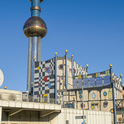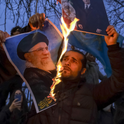NATO ambassadors are meeting this afternoon in an emergency session to assess their response to the downing by the Turkish military of a Russian jet on the border with Syria.
The meeting is labelled as “informal”, in a conscious effort to calm diplomatic tempers. But there is no doubt that the Alliance is facing an awkward choice between supporting one of its member-states and risking a further downturn in relations with Russia, just when key NATO nations are seeking Russia’s military cooperation in the Middle East. The incident could not have come at a worst time.
Since the Russians first launched their offensive over the crowded skies of Syria in which the militaries of at least ten other nations regularly operate, this was an accident waiting to happen. Israel, which is not an active party to the conflict, acted early to prevent any clashes with the Russians: Israeli Prime Minister Benyamin Netanyahu went to Moscow with the specific mission of concluding a deal under which the air forces of the two countries would regularly exchange information about their whereabouts and activities. The US military did the same at a later stage, albeit more grudgingly.
However, Turkey steadfastly refused to follow suit, largely because it resented Russia’s role in the region, and hoped that Moscow’s offensive would be short-lived. Instead, the Turks protested vigorously when Russian military jets violated their airspace and rushed to enlist NATO’s support: in a communique issued in early October at Turkey’s behest, the Alliance expressed its “deep concern” at Russia’s “irresponsible behaviour”. Turkish officials hinted at that time that they’d be minded to open fire on any incursion, but few took this threat very seriously.
Russia’s contention is that its SU-24 aircraft had crashed on Syrian territory after being hit by ground-based fire. Yet the Turkish military has released video footage purporting to show that the Russian jet repeatedly overflew Turkey’s airspace, and claims that Turkish airforce was responsible for the aircraft’s interception and destruction.
It’s unlikely that either Russia or Turkey actively sought this confrontation; after all, Russian President Vladimir Putin was in Turkey only recently, and relations between Moscow and Ankara showed marked signs of improvement. Still, there is little doubt that Turkey finds a showdown with Russia quite convenient at this moment.
The Turks are increasingly worried by signs that the West is about to reach a deal with Russia, joining hands in the fight against the so-called Islamic State terrorist organisation (IS) which operates out of Syrian and Iraqi territory. French President Francois Hollande is the key promoter of this alliance, in the wake of last week’s terrorist attacks in Paris. And President Barack Obama has indicated that he may go along with an arrangement whereby Russian military assets increasingly coordinate their activities in the Middle East with those of the West. President Putin also likes the idea: he has already instructed his military to treat French naval units now arriving in the region as “allies”.
Yet Turkey is looking askance at such arrangements, partly because the Turks don’t consider IS as their most immediate threat, but also because a closer Middle East cooperation between Russia and the West would severely restrict Turkey’s influence over the future fate of Syria. Turkish President Recep Tayyip Erdogan could have exercised restraint in the face of today’s Russian incursion, but chose not to, since tension between Russia and the West may suit him well.
Be that as it may, NATO has no other option but to support Turkey’s position, even if this scuppers any chances of a future cooperation with Russia. The Alliance will also seek to lower the tone of the confrontation with Moscow. Still, a strong Russian reaction is to be expected; President Putin is not famous for turning the other cheek, and a Syrian military campaign which has until now been presented to the Russian public as both masterly and casualty-free is beginning to look messy and bloody.
French President Francois Hollande, who travels to Moscow on Thursday, will try to contain the diplomatic fallout, and avoid a bigger rupture in Russia’s relations with other key military actors in the Middle East. But the incident underlines the fact that Turkey’s stake in the Syria conflict cannot be ignored. And it also acts as a reminder that Turkey’s wily President Erdogan never misses an opportunity to transform any adversity into a triumph for his country.












